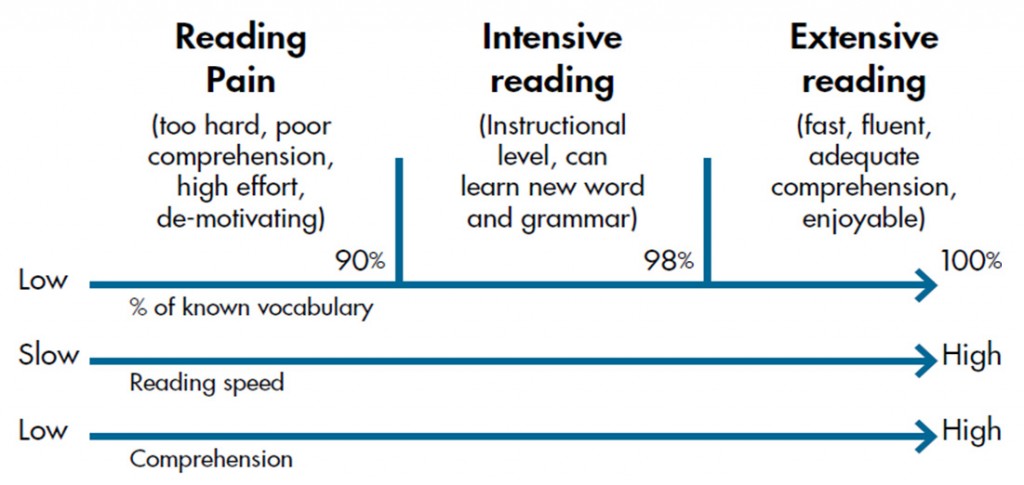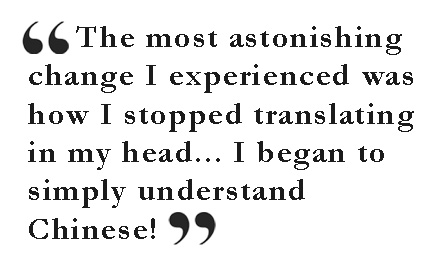“So, what should I read to improve my Chinese?” he asked as I looked disapprovingly at his book. Zach* had come to Shanghai as part of an exchange program to study business and Chinese. With no previous Chinese skills, he studied hard and quickly worked through the basics of the language. After a few months, I invited him over for a nice home cooked meal and to see how he was doing. He excitedly showed me his recently purchased copy of Jack Welch’s autobiography… in Chinese. He opened it to show me his progress; I saw how the margins were covered with pinyin and every other word had underlining with a definition scribbled beside it. He had been at it for a week and was pleased that he had struggled through two pages and “learned” a lot of new characters.

Zach was not the first to have done this and certainly will not be the last. So what level should he read at? I’ll begin with a couple points about language learning that virtually all language researchers agree upon.
- We need enough repetition to learn new words: Our brains do not learn things all in one instance and we quickly forget many things we learn, especially recent knowledge. We tend to pick up complex things like language in small incremental pieces rather than in whole chunks. For example, we know that it takes 10-30 or even 50 or more meetings of an average word before it is truly learned. Once we understand the meaning, there must be enough exposure to the word in different contexts before we understand how it is used. Basically, a learner must have enough exposure to the language before it is learned and can be used.
- We need comprehensible input: Learners can learn new words from listening or reading IF the language is comprehensible. This “input” can be listening or reading, but it must be at a level that the learner can understand for learning to take place. For example, we speak to a three year-old child much differently than we would to a college professor. To a child, we speak in a way that can be understood while gradually introducing new words and ideas. If we spoke to a child in the same way as a college professor, they would understand little of what is said and learn at a much slower pace. The same principle is applicable to learning a second language: the input (language) must be at a comprehensible level.
Keeping these two points in mind (enough repetition, comprehensible input), the experts at the Extensive Reading Foundation have put together this handy chart to help you determine your appropriate reading level.

Extensive Reading
If you are reading at a 98-100% comprehension level you are reading at an “Extensive” level. At this level, you able to read at a faster pace without stopping every few words to look up a definition. Because you are reading quickly, you encounter more new words in a shorter period of time although there are less new words per page. You get enough repetition that is needed to build fluency in the words you know while at the same time learning new words. Grammar patterns begin to click and reading becomes easier. By reading at this level, you are able to appreciate the story in the foreign language and it turns into something enjoyable. Many people feel that it ceases to become study and turns learning into something fun.
Intensive Reading
If you are reading between 90% and 98% comprehension, this is an “Intensive Reading” level, also known as “Study Reading”. Most learners are familiar with this type of reading commonly found in textbooks in the form of short articles introducing many new vocab words. At this level, you know enough of the words in the book to understand what is going on most of the time but still need to frequently stop and look up many words. Although there are more new words per page, research has shown that learners are less likely to retain the words because there is not enough repetition and reading at a slower pace results in reading less words.
Reading Pain
Below 90% comprehension (one unknown word in 10), reading becomes frustrating and slow. I think we’ve all been here at one time or another. You have to stop every few words to look up a character, slowly limping along as you grind through the sentence. By the time you’ve read the sentence, you go back to read it again but have already forgotten most of the words you studied. Since you can’t remember what you’ve read, you instead try to remember the meaning in English. 30 minutes later, you’ve made it through a couple paragraphs and you don’t even remember what you read before. Reading at this level is less effective. While you encounter a lot of new words, you don’t have anywhere near sufficient repetition needed to truly learn the words and comprehension suffers badly. Most people find this to be a de-motivating task.
The Right Level
It’s clear that Extensive Reading meets two basic language learning fundamentals: provides enough repetition at a high level of comprehension. Intensive reading has it’s time and place, however learners reading at the Extensive reading “sweet spot” can start to experience significant improvement similar to my own experience. You should match your books to your reading level.
Graded Readers are helpful because they provide reading materials that can be matched to a learners level. If you want to know if a book is at your level, open it up and have a look: if there are 3-5 unknown words on the page, it may be at your level, however at 10-20 or more unknown words, you’ll want to work towards this level or start with easier books. The eventual goal of every learner should be to progress towards Actual Readers (native level books such as the Jack Welch autobiography) but only when they can read it with a high level of understanding.
As for Zach, I extolled the virtues of Extensive Reading. I loaned him a low level Chinese graded reader to rescue him from the clutches of Reading Pain. It was still a bit above his level, but he had a much better experience working through easier text. He managed to learn a lot more…even if he dabbled in that Jack Welch book from time to time.
Jared Turner
*Name has been changed to protect the innocent






